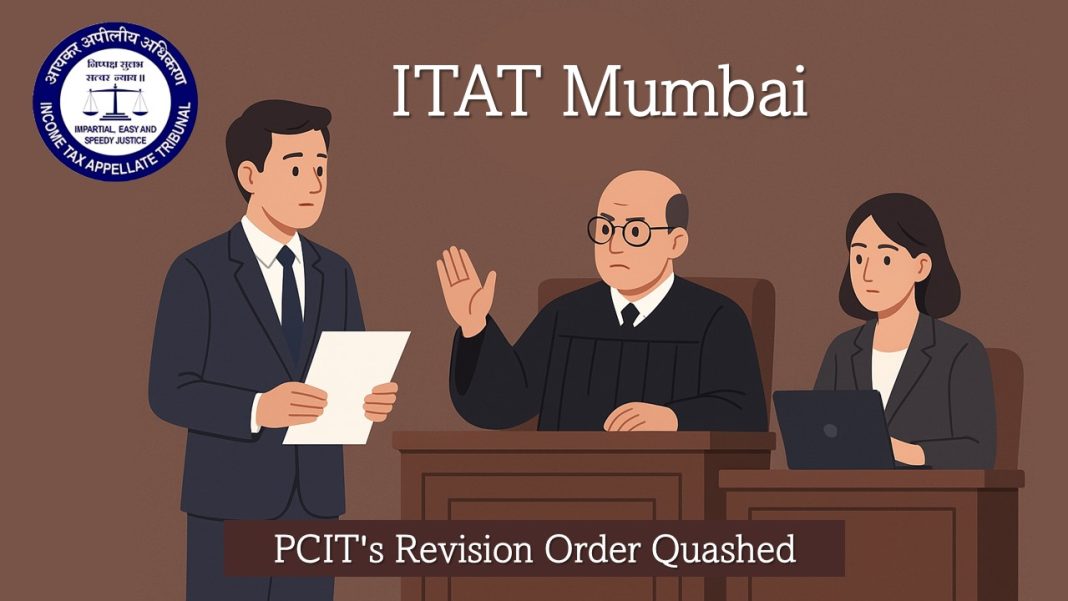ITAT Mumbai Quashes Section 263 PCIT’s Revision Order As AO Had Made Due Enquiry on ESOP Claim
The present appeal has been filed by Nuvama Wealth Management Limited (Appellant) in the Income Tax Appellate Tribunal (ITAT), ‘B’ Bench Mumbai, before Shri Amit Shukla (Judicial Member) and Ms Padmavathy S (Accountant Member), against DCIT, Pratishtha
Bhavan, Mumbai (Respondent). The matter was heard on October 09, 2025, and the final decision was announced on October 31, 2025.
The appeal had been filed challenging a revision order dated March 26, 2024, issued by the learned Principal Commissioner of Income Tax (PCIT) (Central)-1, Mumbai, under section 263 of the Income-tax Act, 1961.
In current case, the order of the Principal Commissioner (PCIT) had set aside the company’s earlier assessment done under Section 143(3) read with 144B on 30 September 2021, and directed the Assessing Officer (AO) to conduct a fresh assessment on one issue, the allowability of Employee Stock Option Plan (ESOP) expenditure claimed by the company.
During the initial assessment, the company claimed for deduction of ESOP cost amounting to Rs. 73.30 crore under Section 37(1) as ESOP expenses. These ESOPs were granted by the parent company, Edelweiss Financial Services Limited (EFSL), to employees of the assessee (Nuvama) as part of a group incentive plan. The PCIT, while assessing, had allegedly received Rs. 58.02 crore back from EFSL and concluded that this meant a large portion of the ESOP expense had been “reimbursed.” Therefore, according to him, only Rs. 15.27 crore (i.e., Rs. 73.30 crore – Rs. 58.02 crore) could actually be claimed as a deduction.
He said the assessing officer (AO) could not properly verify this point and therefore called the assessment “erroneous and prejudicial to the Revenue.” This is the reason why PCIT dismissed the earlier order and remanded the case for fresh assessment.
To support its case, the company cited earlier judgments titled Biocon Ltd. v. DCIT (Special Bench, 2013) and CIT v. Biocon Ltd. (Karnataka High Court, 2020). These cases held that an ESOP discount is a deductible business expenditure, even if no cash outflow happens, because it’s a form of employee remuneration. Also, several other cases, such as Lemon Tree Hotels, HDFC Bank, Goldman Sachs (India) Securities, Cera Sanitaryware, Dr Reddy’s Laboratories, Bharti Airtel, and others, were also referenced to support the case.
When the case was taken to the Income Tax Appellate Tribunal (ITAT), ‘B’ Bench Mumbai, the tribunal analysed both sides and endorsed the company’s side as it had already checked every detail before claiming ESOP expenses. The Tribunal ruled that the assessing officer had adequate enquiries, applied his mind, and followed the law. The PCIT does not have that much authority to revise an assessment just because he has a different opinion on facts or law. Section 263 can be used only if there is no enquiry at all or the order is clearly wrong and prejudicial.
In this case, the AO’s view was a valid and legally correct view based on established court decisions. Therefore, the PCIT’s order was invalid because it was based on wrong facts (the supposed recovery of Rs. 58.02 crore) and misapplication of the law.
The Tribunal set aside the PCIT’s revision order dated March 26, 2024, issued under Section 263 and restored the original assessment order dated September 30, 2021, issued under Section 143(3) read with 144B. Meaning the appeal filed by Nuvama Wealth Management Limited has been allowed.
Citation: Nuvama Wealth Management Limited Vs DCIT (ITAT Mumbai); ITA No.2559/Mum/2024; 31/10/2025; 2018-19
Refer to the official judgement for complete information.



